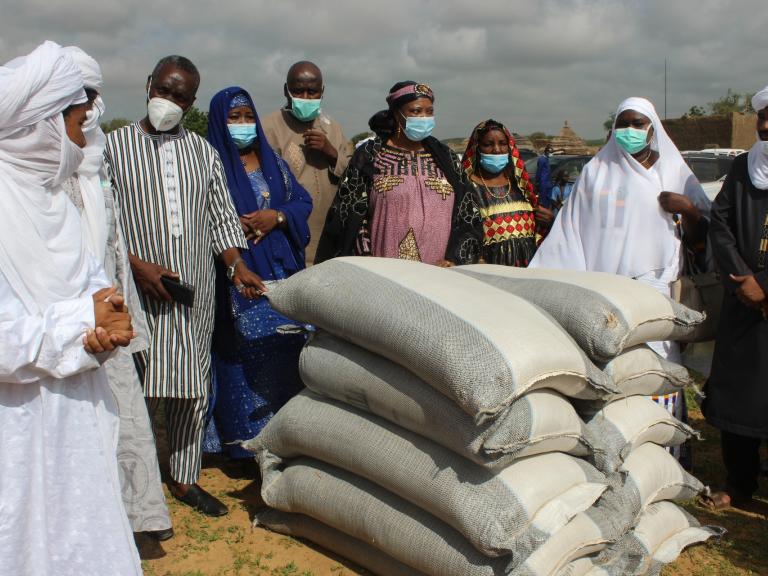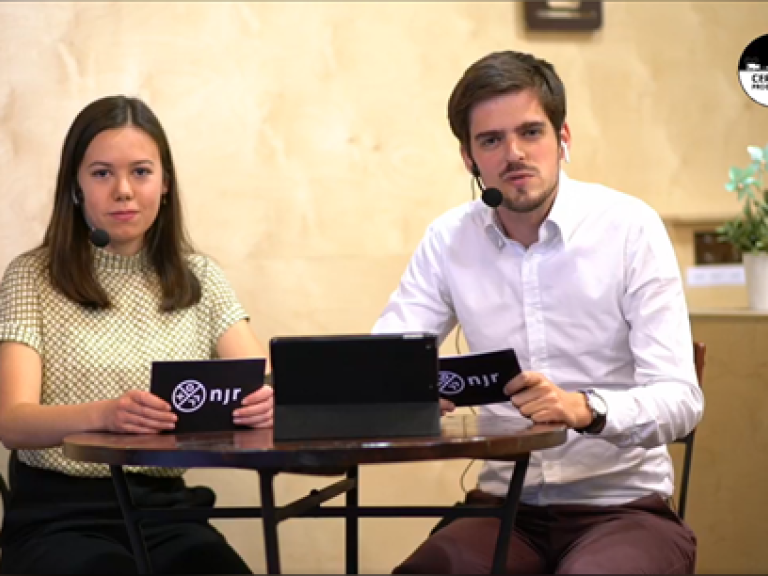-
Last updated on

The COVID vaccines are almost ready for shipment. Image of the Pfizer plant in Puurs (Belgium).
© Pfizer
‘No-one is safe until everyone is safe’. This mantra formulates a clear guideline for how we should address the COVID-19 pandemic worldwide. Because it is completely true – no country in the world will be safe from COVID-19 until all countries are safe.
All countries should therefore be able to vaccinate their populations. The global vaccination campaign is proceeding too slowly, however, and is also unbalanced, according to Belgium. That is why our country is calling on the international community to step things up a gear.
For its part, Belgium is making a variety of efforts to remedy the situation. In the short term, it wants to overcome the current pandemic, while in the longer term, it intends to strengthen health systems and increase production capacity worldwide. The goal: to enable poorer countries – the so-called Low and Middle Income Countries – to take the response to any future pandemic into their own hands.

From the very beginning of the crisis in 2020, Enabel delivered four fully equipped ambulances to DR Congo.
© Enabel
Short term – vaccine supplies, medicines and emergency aid
- According to Belgium, the COVAX initiative is the best mechanism for guaranteeing the vaccines are distributed fairly (see box). Our country is supporting COVAX by providing €4 million in 2021 through Team Europe, the EU's pooled effort that currently amounts to €2.47 billion.
- In addition, it will donate more than 8 million vaccine doses by the end of 2021, primarily via COVAX. In July, some 187,000 AstraZeneca vaccines were already donated to Armenia, with the delivery taking place on 5 September. In August, our country donated over 1 million AstraZeneca vaccines to Belgium's African partner countries. Deliveries are expected in September. Starting in autumn, donations with Johnson&Johnson and Moderna vaccines will also be possible. This will allow an average of 1 million vaccines or more to be donated per month.
- From the start of the pandemic in 2020, Belgium has assisted its partner countries by providing protective equipment, oxygen and testing capacity. One of the ways this was achieved was via the Belgian development agency, Enabel. Belgium continues to be ready to provide technical and financial support to support the roll-out of vaccination campaigns in partner countries.
- It also provides emergency aid to countries that request it via the European Civil Protection Mechanism (UCPM). So far, our emergency team, B-FAST, has delivered supplies to: Guinea (760,000 mouth masks), India (9000 vials of Remdesivir), Nepal (1 million surgical masks, 2000 nasal oxygen catheters), Namibia (125,600 KN95 masks) and Tunisia (approx. 17,000 vials of medicines and intensive care medical equipment and protective equipment). In addition, Belgium also donated 150,000 vaccine doses to Tunisia.
What is COVAX?
Through COVAX, the international community aims to deliver more than 2 billion vaccine doses worldwide by early 2022. This will make it possible for 30% of the world's population to be vaccinated. Within each country, vaccines are allocated as a matter of priority (1) to healthcare personnel and (2) to the most vulnerable.
Of the 2 billion doses supplied, 1.8 billion doses will go to the 92 low- and middle-income countries. They will also receive a “safety kit” with syringes in order to administer the vaccines. In addition, a “no-fault compensation fund” is being provided to protect those countries from legal claims in the event of serious illness or death following the administration of a vaccine.
All COVAX vaccines are jointly tendered, negotiated and procured by Gavi, The Vaccine Alliance. The deliveries are carried out by Gavi, in collaboration with organisations such as the United Nations Children's Fund (UNICEF). UNICEF possesses the ideal combination of logistical and legal expertise and has strong relationships with the Ministries of Health of the countries involved.
Structural solutions: strengthening healthcare systems and increasing vaccine production
Strengthening healthcare systems
- Belgium wants to strengthen healthcare systems so that they are able to cope with current and future pandemics. In 2020, our country donated an additional 4 million euros to the World Health Organization (WHO) for this purpose.
- Belgium's development co-operation is committed to ensuring robust healthcare systems in its partner countries, without losing sight of the impact of gender, environment, nutrition, sanitary facilities and social protection. Its efforts are based on the concept of One Health: namely, that human health is inextricably interwoven with the health of animals and of living environments.
- Belgium is advocating a global framework for pandemics in the form of a pandemic treaty. A pandemic treaty should give sufficient attention to more robust healthcare systems, universal health insurance, equal access to medicines in times of crisis, human rights, prevention (healthy air and diet, exercise) as well as the One Health approach.
Scaling up vaccine production
- Belgium wants to strengthen and develop the global health architecture (“to build back better”) so that all countries are given improved access to vaccines, medicines and health technologies. That is why it is looking for opportunities to increase the world's vaccine production capacity, especially in Africa. It therefore supports the ambition of the African Union to deploy locally produced vaccines.
- The EU wants to invest at least 1 billion euros in better healthcare systems in Africa. Belgium is doing its bit and is currently looking for opportunities to provide short-term assistance to Senegal, Rwanda and South Africa for the local production of COVID-19 vaccines.
- A first concrete initiative is to support the production of vaccines and medicines in Senegal. Belgium is earmarking €500,000 from the government cooperation portfolio for that purpose. For example, a number of workshops will support Senegal in structuring its pharmaceutical industry, including within the Pharmapolis pharma hub. The Belgian private company, Univercells, will also assist the Institut Pasteur de Dakar to produce its own COVID-19 vaccines. Bio-invest – the Belgian Investment Company for Developing Countries – is also following up the dossier of local vaccine production at the Institut Pasteur Dakar.
- Belgium supports C-TAP (the COVID-19 Technology Access Pool), a mechanism through which the WHO is aiming to facilitate the transfer of technologies, data and licences. After all, knowledge sharing is essential if we are successfully going to drive up global vaccine production.
Trade and health
- Belgium is calling for more effective distribution by lifting export restrictions on COVID-19 vaccines and ingredients. TRIPS - the Trade-Related Aspects of Intellectual Property Rights of the World Trade Organization (WTO) - must be fully utilised to enable the local production of vaccines.

On 10 September 2021, 405,600 AstraZeneca vaccine doses were officially handed over to Senegal. On the left Ambassador Hubert Roisin, on the right Senegalese Minister of Health Abdoulaye Diouf Sarr.
© Ambabel Dakar
Production and export
- Belgium has already played a leading role in the pharma and biotech sector for many years. Not only in research & development (R&D), but also in clinical trials, production, logistics and export. Our country even boasts the highest biopharmaceutical R&D expenditures per capita in Europe (€13 million per day in 2020). It is also in second place with regard to the number of patent applications per capita and in third place with regard to the number of clinical trials.
- Belgium is making an active contribution towards research and development into COVID-19 vaccines, including by means of its long tradition of investments in R&D. It also donated €5 million to the Coalition for Epidemic Preparedness Innovations (CEPI): a platform of private and public actors working together to speed up the development of vaccines.
- Our country has already produced hundreds of millions of COVID-19 vaccines, including within divisions of Pfizer, Johnson & Johnson and GSK/CureVac. Many smaller biotech companies, such as Univercells and Eurogentec, are doing pioneering work in the area of production.
- Since the beginning of February 2021, Belgium has already exported 435 million vaccine doses (mainly Pfizer), which is equivalent to two thirds of the total quantity exported from the EU (figure correct as at 6 September 2021).
- Belgium is also home to important international logistics hubs for the worldwide distribution of COVID-19 vaccines, in particular the airports of Brussels and Liège and the port of Antwerp. Each of these has invested heavily in the efficient transport of temperature-sensitive products such as vaccines and this has borne fruit. Brussels Airport has even achieved international recognition as a Centre of Excellence. The port of Antwerp is at the forefront with regard to the maritime transport of pharmaceutical products in refrigerated containers.
- Since April 2020, Liège Airport has been the only airport in Europe to form part of a UN network of 9 airports worldwide for the distribution of medical and humanitarian materials. Since then, hundreds of millions of masks, medical gloves, test kits and respirators have been distributed around the world via Liège each month.
More on Corona crisis

2.5 million euros for COVID-19 emergency aid
Belgium is supporting SFERA, an emergency fund from the UN Food and Agriculture Organisation (FAO), to intervene quickly in coun...

Virtual SDG summit: urgent action needed in times of COVID-19
At a fully virtual SDG summit, enthusiasm remained for achieving the UN's Sustainable Development Goals (SDGs), even after the s...

The post-corona society needs to be more inclusive, sustainable and resilient
The Belgian Development Cooperation intends to do everything it can to mitigate the socio-economic consequences of the COVID-19 ...
